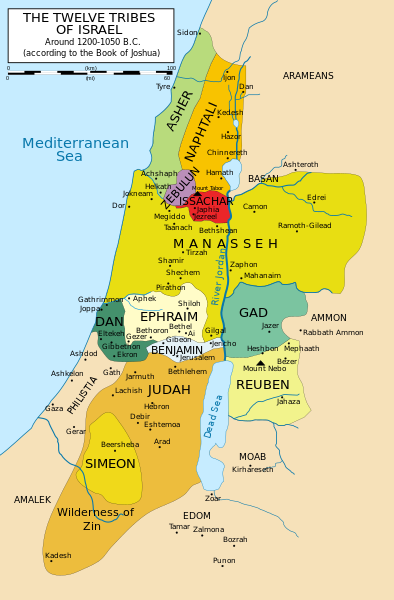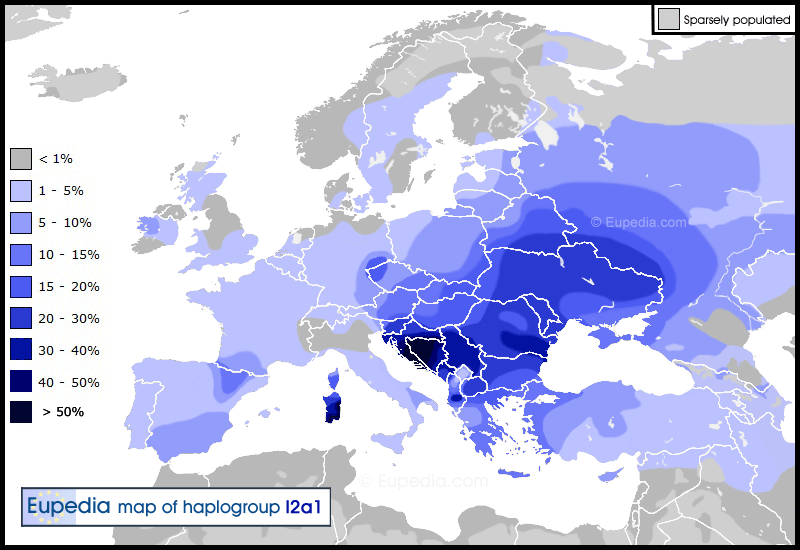http://webcache.googleusercontent.c...p+I+the+tribe+of+dan&cd=7&hl=sv&ct=clnk&gl=se
The YDNA groups
All other YDNA groups from G to R2 are derived from one central
Haplogroup F. This F group is central to both Shem’s and Japheth’s known lineages. We will start with Lineage F, which is P14, M89, M213. This line is the basic line for G, H, I, J, and K.
We know that the lineages in known Semitic nations are G, I and J. There are also some lineages of E3b African or Hamitic lineages together with some R1a and R1b. These lineages with G also spread to Turkey, Georgia/Armenia and Italy.
Conventional wisdom identifies the Middle-East Arabs as
Haplogroup J and the Jewish Aaronic priesthood, which has an identified clear lineage to Shem, is at J2. This
Haplogroup division identifies also the Buba clan of the Lemba
tribe of Zimbabwe as Aaronic priests, and they have been separated from the rest of Judah/Levi for up to 2,500 years. Thus the J2 division is at least as old as that separation.
There are also a significant number of divisions in Judaism that show that Judaism is a religion and not a single
Haplogroup lineage.
For example, whilst the Aaronic priesthood is identified as J2, the Levitical structure of Ashkenazi Jews are 52% R1a1, which is an identified Japhethite lineage occurring in Russia and the Central and Eastern Steppes and among the Aryans in India. It is Slavic. Also, 25% of all East European Jews are E3b, which indicates an Hamitic origin.
One hypothesis concerning the E3b origin is that Egyptians interbred with the Israelites. Another is that the Mixed Multitude involved E3bs, as there were some two million Israelites and approximately six hundred thousand of the Mixed Multitude. That would constitute 25%. However, when we read the genetic accounts of the Milesians they claim to have been part of the mixed multitude also in the Exodus. They are R1b. Thus, the explanation must involve later conversions to Judaism from Hamitic lineages. We find these in the occupation of Canaan under Joshua.
Canaan was a son of Ham and a number of sub-tribes were spared and joined Israel in some cases by subterfuge. The Ethiopian conversions were also of significance and so we have ample explanation for the E3b lineages at 25% of the Ashkenazim. The Amorites and the Southern Hittites also entered and bred with Israel. There are also significant levels of E3b in Syria, Turkey and among the Greeks at up to 30%. The Greeks are up to 30%
Haplogroup J or known Semites also with up to 20% Hg I as well, which is also a prevalent
Haplogroup among both known Semites and Europeans.
 http://en.wikipedia.org/wiki/Israelites
The Israelites were a Hebrew-speaking people of the Ancient Near East who inhabited the Land of Israel during the monarchic period (11th to 7th centuries BC).
http://en.wikipedia.org/wiki/Israelites
The Israelites were a Hebrew-speaking people of the Ancient Near East who inhabited the Land of Israel during the monarchic period (11th to 7th centuries BC).
The
11th century BC comprises all years from
1100 BC to
1001 BC. Although many human societies were literate in this period.
The
7th century BC started the first day of
700 BC and ended the last day of
601 BC.
Macedon/Macedonia:
The lands around Aegae, the first Macedonian capital, were home to various peoples. Macedonia was called Emathia (from king Emathion) and the city of Aiges was called Edessa, the capital of fabled king Midas. According to legend, Caranus, accompanied by a multitude of Greeks came to the area in search for a new homeland took Edessa and renamed it to Aegae. Subsequently, he expelled Midas and other kings off the lands and he formed his new kingdom. According to Herodot, it was Dorus, the son of Hellen who led his people to Histaeotis, whence they were driven off by the Cadmeians into Pindus, where they settled as Macedonians. Later, a branch would migrate further south to be called Dorians.
It seems that the first Macedonian state emerged in the 8th or early 7th century BC under the Argead Dynasty, who, according to legend, migrated to the region from the
Greek city of
Argos in Peloponnesus (thus the name Argead). The Macedonian tribe ruled by the Argeads, was itself called Argead (which translates as "descended from Argos").
When the destruction of Israel, c.722 BCE occurred, a nation was born named Mace-don (people from the tribe of Dan)?
http://en.wikipedia.org/wiki/Midas
Midas or
King Midas (in
Greek Μίδας) is popularly remembered in
Greek mythology for his ability to turn everything he touched into
gold. This was called the
Golden touch, or the
Midas touch. He bears some relation to the historical
Mita, king of the
Mushki in Western Anatolia in the later 8th century BC.
There are some different accounts of Midas' life. In one, Midas was king of
Pessinus, a city of
Phrygia, who as a child was adopted by the king
Gordias and
Cybele, the
goddess whose consort he was, and who (by some accounts) was the goddess-mother of Midas himself. Some accounts place the youth of Midas in
Macedonian Bermion (See
Bryges) In
Thracian Mygdonia, Midas was known for his garden of roses:
Herodotus remarks on the settlement of the ancient kings of Macedon on the slopes of Mount Bermion "the place called the garden of Midas son of Gordias, where roses grow of themselves, each bearing sixty blossoms and of surpassing fragrance". In this garden, according to Macedonians,
Silenos was taken captive. According to the
Iliad (V.860), he had one son,
Lityerses, the demonic reaper of men, but in some variations of the myth he instead had a daughter, Zoë or "life".
When you talk about people or countries of today or antiquity its almost impossible to tell if they where same because of similar culture, language, genetics and more. All people with same religion, language and nation are not based on to exist because of same genetics.
Israeli peoples (modern or ancient) are not haplogroup I?
Can you really prove your statement about the origin of the Israelites and others like Macedonians and what genetics they had or have?
Then you will get the Nobel prize.






